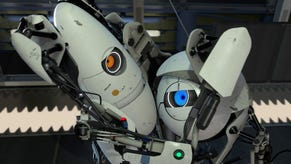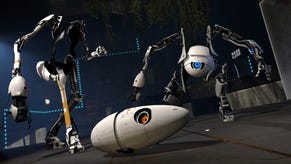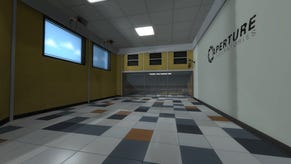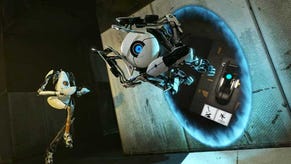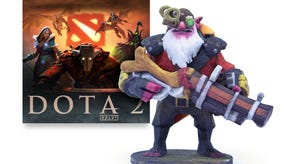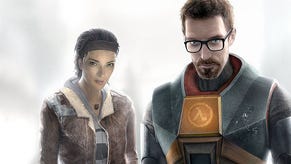Portal 2 releases - Unreview, uninterview, unstudiovisit
Longing for Portal 2? Justin Kranzl brings you everything you need, bar the game itself - a play-through, a Q&A with project leaders, and even a glimpse inside Gabe's knife room.
[Ed note - In case you missed it, Portal 2 is out now.]
Human beings have a morbid fascination with the notion of machines rebelling against the accepted notion of silent efficiency - and what that spells for us, their creators. It's a theme film explores frequently, from Terminator (destroy all humans), through to The Matrix (turn them into batteries).
Strip away the comedic overtones and as a game which revolves around the notion of AI gone amok, Portal 2 most brings to mind Blade Runner's take on machines becoming more human than human. The game's main stars - GLaDOS and Weatherly - are both AI constructs brimming with sass and life. In contrast, the protagonist Chell is a mute cypher, a canvas left deliberately blank for players to imbue with their own characteristics.
"Every time we talked to people they didn't talk about Chell's relationship to GLaDOS or what Chell had done in the first game, they were always saying what they did in the first game." Portal 2 project lead Josh Weier told us.
"The more we tried to do anything with the Chell character, the more they told us 'Err, it doesn't feel right'."
Valve - never shy of community engagement - took that advice on board in a big way. While once again you will see Chell occasionally courtesy of her reflection showing via a portal - she plays the silent straight woman to her silicon counterparts.
They're the real talent, and come in the form of GLaDOS - once again expertly voice acted by Ellen McLain, and Weatherly, played in inspired fashion by Stephen Merchant. The co-creator of The Office and costar on The Ricky Gervais Show does a terrific job of infusing a machine with personality. Neurotic, paranoid and harried, Weatherly functions as more than a mere sidekick - he's a crucial plot driver and even steals the show from the original star, GLaDOS.
The premise
This time around Chell is awakened by the aforementioned Weatherly, an AI drone who is convinced she is brain damaged. Chell's in a convalescence suite in the Aperture Science facility, which is destructing before your very eyes, and Weatherly is trying to help effect your (and "his") escape.
Before long you reacquaint yourself with Portal's antagonist, GLaDOS, who is more than a little bitter about how the first game ended. There's real menace when you see her power up,
It's no exaggeration to say Portal 2's plot and characters are the biggest selling points of the game
And soon after, you're injected into Portal's signature, familiar play. GLaDOS adopts a wounded, whimsical tone with you puts you through your paces in a succession of deadly chambers while Weatherly takes leave of absence as he tries to figure out a way for you both to escape.
When Chell does liberate herself from her confines, the design effortlessly shifts from the enclosed chambers to the ruins of the facility in a cat and mouse chase with GLaDOS. Her journey even encompasses the back story of Aperture founder Cave Johnson. The ghost of Johnson persists in his recorded voice, which auto-assigns Chell a new battery of tests. Johnson's test regime reflects his increasing frustration and decline, and in doing so also offers a deeper understanding of GLaDOS' origin.
It's no exaggeration to say Portal 2's plot and characters are the biggest selling points of the game. That's not to demean the way it plays; it's just that the story and personality of Valve's game are worlds apart from other well executed physics-based puzzlers or first person titles. The seamless blending of the two play types is laudable, but without the plot it's just another 'clever' game.
As our interview with Portal 2 writer Erik Wolpaw and project lead Josh Weier indicates, Valve doesn't observe standard practice when it comes to design documents and working with their writing teams. The game is "the design document", and writers work on an ongoing, close basis with the development team - not just occasionally.
Then there's how it plays
Portal 2's mechanics are beyond reproach. The puzzle solving element is never unfair - there's always a logical solution (or solutions plural) to each chamber and level. The game glories in simplicity.
For the uninitiated, Portal 2's gameplay mechanic is disarmingly straight forward. Your control options in single player are limited to movement, jumping, an "interact" key to pick up objects or press buttons, a zoom button, and the portal gun itself.
The gun can "fire" two different portals - one orange, the other blue - onto white coloured ceilings, floors, or walls. The colour doesn't matter - what is important is that both types of portal are present. When they are, a player can move through one, and exit the other.
Momentum is factored into the equation - jump off a long drop onto a portal and you will exit at high speed - crucial for reaching hard-to-reach places. Portal manipulation also allows players to redirect tractor beam paths and light-based walkways and barriers.
Also in Chell's arsenal, when the level permits, are weighted cubes to activate pressure sensitive buttons and light refracting cubes that can be used to fry the game's signature turret combat robots or trip laser switches.
But there's more: the introduction of gels add a nice layer of additional complexity to the portal gun. These gels - liquids that can be applies to any surface in the game - come into play via pipelines usually flowing into a floor. Players use the portal gun to redirect the flow of these gels onto different surfaces.
There's three flavours: the blue repulsion gel, which makes surfaces bouncy, an orange speed gel, which allows increases acceleration the longer you traverse it, and finally the white gel - it turns any flat surface it's applied to into a portal-friendly one. All three are critical in the final battle. Critical in the "you won't finish the game if you can't master them" sense - although to be fair you won't make it to the final battle if you haven't.
Speaking of difficulty, the game's tuning and balance progression is admirable. You're never given objects in a level that perform no use. Any red herrings you may find are of your own devising - you're given all the tools to make an expeditious exit in each level.
The way the gels come into play is a case in point - and a good lesson for designers. Upon introducing a super influential new game mechanic in the sequel to their hit game, many game designers would be tempted to rush it in front of players to ensure they were making use of it from a very early mark.
Not so in Portal 2. The game's design team has demonstrated restraint - gels make their appearance in the latter half of the game, as Chell is navigating the ruins of the Aperture Science Facility - and not all at once. By the time the player needs to master the use of all three at once, they have had multiple levels to master their use.
The console versions we played acquitted themselves well - but Portal 2 remains best on the PC
Platforms
The console versions we played acquitted themselves well - but Portal 2 remains best on the PC (or assuming it runs the same, Mac). With a time limit rarely in play (there's one notable exception in single player - the final encounter) it's not that PS3 or Xbox 360 versions are less precise - it's that a mouse and keyboard combination allows speedier precision.
Visual differences between console and PC are noticeable when viewed alongside each other, but not obnoxiously so. A quick look at the video options screen suggests why the PC version looks sharper - texture, effect and shader detail were all maxed out. For those interested in further detail, the review PC was set up at 1280x720 resolution, with 16x CSAA, 4x Anisotropic filtering with multicore rendering enabled.
While the resolution was at console levels, the filtering and anti-aliasing settings on the demonstration machine would make unreasonable demands of current-gen hardware (and if you're running with a 256MB or less video card on your PC - most likely yours as well).
Importantly, to the naked eye framerate on the console versions was smooth. The fixed rate of motion of the controllers no doubt helping - it's not like you can whip your view through 360 degrees in an engine-taxing split second.
Cooped Up
When it comes to the game's co-op mode, the setting remains, but the storyline is largely disregarded. Players take the role of robots tasked by GLaDOS to complete chambers together. Every chamber in co-op requires both players to contribute - separation mechanics ensure a dextrous, smart player can't solo a level while the other player idles.
GLaDOS' tone with the co-op robots is markedly different to that which she adopts with Chell. There's an air of maternal disapproval when she chides players for indulging in a post-level celebration of rock, scissors, paper, comparing them to mere humans.
Those celebration moves are part of an array players unlock as they play. They exist mainly for entertainment value - many will interrupt what the other player is doing if you're within range as well, with some amusing results.
When we were attempting a puzzle requiring timed coordination, my partner went for the high five. Result: GLaDOS docked him five co-operation points. I returned the favour, incurring a penalty of 50. Subsequent transgressions resulted in 500, then 5000 point fines. I couldn't see if these points were tracked anywhere, so I'm hoping (for my record's sake) they aren't recorded.
Scenarios like the above play out often in co-op. Figuring out a solution to a chamber or level in single player might be half the battle, but in co-op it's more like one tenth. You still have to secure the agreement with your partner (who doubtless thinks their approach is better) and hope they have at least your level of control dexterity.
Then there's the Mouse Trap effect - the notion of seeing what will happen to your partner if you trigger that nearby laser switch or use your portals for evil - redirecting them at the last second to send your hapless friend hurtling into a pit of slime. The Mouse Trap effect will account for a healthy portion of your time as you and your partner figure out new ways to grief each other.
Co-op essentially trades the cracking Portal 2 yarn for the can't-fail enjoyment factor of playing with friends in a perilous environment. It's a sensible inclusion and a clever way to drag people into the Portal world.
Prognosis
Portal 2's sole deterrent is replayability. Most normal people should clock six-to-seven-plus hours finishing the single player game. Once you do so, the emphasis shifts from unravelling the story and figuring out each level to refining your times and nostalgia. No matter how much the game grabbed you the first time, subsequent playthroughs won't be able to compare.
Co-op isn't immune from this diminution either. If one or both players have completed co-op before, those highs will prove to be a hard thing to maintain.
It's a downside of going so strong on story in a game which revolves around solving physics puzzles - but Portal 2 would also be a much worse game without it. The characterisation is truly outstanding - Valve deserve kudos for making GLaDOS and Weatherly two of gaming's more memorable figures in a sea of cardboard cutouts. Wrap it all together and you have an product gamers should be proud to patronise.
Portal 2 Q&A with Erik Wolpaw and Josh Weier
VG247: What are the advantages of having a silent main character?
Erik Wolpaw, writer, Portal 2: Ah so... Josh? [laughs]
VG247: As the guy who does all the dialogue, Josh...
Josh Weier, project lead, Portal 2: It's interesting. For me it goes all the way back with the company, way back to Half Life 1. I wasn't with the company at that point so when I played Half Life 1 as a player I think for me it let me put myself in the world. I didn't have to play a character, I didn't have to feel like I was crammed into something, I could just be there and it could be my experience.
I think a lot of people felt the same way in Portal. As we started building Portal 2 we started to talk about the main character Chell... what she looks like. But every time we talked to people they didn't talk about Chell's relationship to GLaDOS or what Chell had done in the first game, they were always saying what they did in the first game.
So when they talked about their relationship with GLaDOS, it was about their relationship with GLaDOS. The more we tried to do anything with the Chell character, the more they told us 'Err, it doesn't feel right, I don't have any relation...'
VG247: So it didn't conform to their expectations?
JW: Yeah, and I think it's a subtle thing, but I think it's an important thing for players to be wrapped up in that world and not suddenly have their character saying something out in the middle of nowhere and they're like 'Where did that come from?'
I think that pulls you away from the game a little bit.
EW: You can agree or disagree, but from my perspective it's not like there's a lack of personality in the game... a gaping void that needs to be filled by Chell's voice. It's also a comedy game - there's two modes of comedy. There's the straight man who is surrounded by a world gone mad, and there's the crazy man who is surrounded by a normal world. And you're playing those two off each other.
Portal's definitely the former - you're surrounded by a fair amount of absurdity and craziness and you're effectively playing the role of the straight man. But in a movie, it would be really weird to have the straight man main character never say anything, that would draw attention to itself. But in a game, I don't know if you would benefit by having a straight man who has a bunch of straight character lines. You are the player - it's you reacting to this craziness around you.
It's almost the perfect fit for a silent protagonist. There's a bigger issue in general, silent protagonists, but if any game works for a silent protagonist, I'm pretty comfortable with Portal being a game with [one].
VG247: Do you think that's a lesson for other developers when it comes to characterisation? To take a step back where exposition is involved?
EW: Any time we put exposition in the game - or I do as a writer - I feel guilty somehow, like "Ahh f**k!". There should be a better way - or I'm not doing my job well enough. We should be able to smuggle the exposition though in an entertaining way-
VG247: "Show don't tell"?
EW: Exactly. That's just a lesson for anybody - you fail at it as a writer all the time. All of a sudden you realise it - you're like "F**k it, there's no other way to get this, I'm just ... here comes the exposition buddy."
So yeah, less is definitely more.
VG247: Where there decisions or ideas in Portal 2 you ended up discarding at the 11th hour?
JW: I think there were a lot of things we experimented with but in most cases we proved them out to not be worthwhile or at least not worthwhile enough to be worth devoting time to. The whole process was really organic. Playtesting is a big part of our process at Valve, I think a big part of that is submitting everything to Science as it were. We'll come up with a design and we'll immediately put people through it - those people reactions and what they tell us is what drives our work.
I don't think there's a lot of times we felt there was an idea we were going to push through - we just really quickly say 'Okay, what's the easiest way we can take this idea and vet it and see what it's like' - and that's pretty much what we do all the time.
EW: There's definitely ideas we tried and they didn't work out for various reasons and we decided 'Let's try something else'. Very little of them went to the 11th hour - about the only thing in the 11th hour... We're trying to tell a story with the lines and the writing and we'd have a tonne of lines written and recorded - and some funny bits that just by the end of the game when you see how it's been assembled there's just no place for this funny bit.
We console ourselves with there's something on the commentary track of Scott Pilgrim where the director is saying "We cut out some really funny stuff and then realised [if we're] at the point where the stuff that we're cutting is still really funny we're probably in a good position. "
That's about the only 11th hour stuff we cut.
VG247: What do you think [film critic] Roger Ebert would make of GLaDOS as a character?
EW: Oh, I don't think he'd have the patience to sit through the whole thing. I just don't think he has any interest in the medium. And not interest to get over the hump, to become acclimated with the grammar of it, to understand what's going on.
I probably have the same thing with opera. I would have to go to a hundred operas and do some outside studying to actually start to enjoy them, right?
Erik Wolpaw: "Forget about the 'fabulous art game.' I'd be happy to make the Caddyshack of games."
VG247: You know why I'm asking. It just seems a pretty decent counterpoint to the usual argument - if games is a process-driven, commercial creation and not art, explain the care that's taken in crafting a character like GLaDOS?
EW: Well, it's craft right? I don't ...artists... that's getting into things that are way out of my depth. Personally, art is such a mushy term that it's hard to get a handle on; we can't even agree on what art means before we start calling what's art and what's not.
Having said that, to put it back to movies, we keep going straight from Galaxians to Anna Karenina - there's no in-between. Forget about the "fabulous art game", there hasn't been a Caddyshack of games yet. I'd be happy to make the Caddyshack of games. That's my goal.
VG247: What was it like working with Stephen Merchant (Weatherly)? He sounds like he had a ball.
EW: My experience of him is that he's a super nice guy, but not a comedian who is "on" until it's time to get "on". He wasn't like...bouncing off the walls or how I would imagine Robin Williams is - it would be tiring to be around him because he's always performing.
Stephen was this very quiet but friendly, focused guy. When it was time to go, he just ... he really threw himself into it. He really, really seemed to care about what was happening.
VG247: How many hours of dialogue did your record for him vs what was cut?
EW: Well I can tell you exactly how many hours we spent recording him which was four four-hour sessions plus two hours...let's just call it 18 hours. But again, that's redoing lines, and talking about the scene, and giving him explanations of what's going on. I don't know how many hours that ended up being.
VG247: Do you think people grasp how difficult it is to put together a coherent script for a game that's expected to have a storyline?
EW: Probably not. I was game journalist and a game player all my life - until I had to actually make a game I had no idea what would actually be involved. I also know that not a lot of game companies necessarily work the same way as Valve works either.
JW: I think a lot of companies make their design document that sets a lot of stuff down in stone and the script can work into that, but we really don't do any of those things. We never really have a design document, the game just its design document. We'll sit down and work out some mechanics and start to pull that together. And again with the playtesting we're always retesting to see what's working.
If something seems to be working really well with people we'll grab that and analyse it and put more effort there. If things are not resonating with people we look for how to fix that or move away from that.
I think the story - I mean these guys (writers) are so integrated with the team too. It's not like they're in a different office writing things and throwing it on the wall. Probably all the best scenes in the game were the writers sitting down with the designers with this goal of "Let's make this area".
[To Erik] Most of the time when you guys were done it was totally different than what we sat down with.
EW: You're trying to think through a game problem. You're like "Well okay, let's have all of us together so we can think through it from a story perspective - what might be funny, but also solves this game problem."
Maybe not a lot of companies have their writers embedded day-to-day with teams focused on a single project for a period of years.
VG247: Does that mean you're wedded to Valve for life?
EW: [laughs] It's hard to imagine there's a better job coming down the pike, because to be honest with you, it's a good job. Unless...you guys know something I don't!
I hope so - I hope to end my career here at Valve. So far it's been incredibly, creatively fulfilling. You get a chance to work on projects that every single one you can be proud of. And you also get the benefit of knowing that you're probably not going to release a turkey because they just would never let it go out the door. I mean - you might fail miserably, internally, but nobody would ever see it basically-
VG247: -Everything's always covered up.
EW: Yeah! There's a lot of cover up. There's a lot of stuff to sniff out here!
VG247: Does Portal 2's characterisation-heavy approach going to inform all Valve titles going forward? For things like DOTA - would you be looking to transplant that kind of approach?
EW: Because I've been so heads-down on Portal, I haven't been working on the DOTA team. It's probably too late at this point to do that, and DOTA - I probably shouldn't answer this question - I know DOTA players have a pretty specific thing in mind and I don't know... you're not starting off with a blank slate there.
You could really do a disservice to the existing playerbase if you were to change it so dramatically and turn it into this light comedy game.
VG247: But do you think imbuing non-traditional genres with a strong story-based approach is something worth pursuing?
EW: I think you could - I don't know whether you'd want to do it with DOTA - but it'd be an awesome thing to do. Not that DOTA is specifically real time strategy, but there have been real time strategy games that have at least taken a stab at doing some interesting stuff with story. I can't think of them off-StarCraft 1 did a good job -
VG247: -Not StarCraft II?
EW: I'm saying StarCraft because I haven't played StarCraft II. Basically anything that came out in the past two-and-a-half years we have not played. [Laughter]
VG247: Portal occupies the same universe as Half Life. Is there a temptation to set all Valve's original IPs in that same universe?
JW: There's a lot of benefits and I think fans love that, but I think there's a lot of freedom...being able to make Team Fortress 2 in its own world - trying to tie those together would have hamstrung us in a way that wouldn't have worked for that product.
EW: It's the same for Left 4 Dead.
JW: I think so. I think it made sense for Portal to do that [be set in the Half Life world] and I think as we move forward we always think about that - I just don't think we ever try to force that.
VG247: Last one - as developers and publishers how do you balance the demands of the community vs your internal design? What happens when there's a difference between what the community wants and where you want to go? What gives first?
EW: It depends on the decision. To a certain extent we're an entertainment company at the end of the day, and a key component of being entertained is being given something you didn't expect, that's surprising. So if you just did everything they asked you, then it's not going to be that surprising or interesting.
Having said that though, clearly feedback ... on a micro-scale our constant playtesting is a form of feedback. A huge amount of success of the games is due to the fact we playtest religiously and take the results seriously.
JW: We're not necessarily coming to a game with an agenda. We have a lot of things we thing are really good, but the playtesting is done with people external to the company. We always focus on what those people play and like and gravitate towards it. I can't think of any time where we've said "We think this is right and the data doesn't prove it out, but we're going to push through."
We always submit to the data and that always comes from the fans.
VG247: Following on from that would you agree ego is something that has to be eliminated from the equation if you're a designer at Valve?
JW: We work in such a collaborative way it doesn't have room to come up. We don't have a lead designer, we don't have someone whose pushing things down, it's always in group. It's weird with us, we'll sit down in a group of seven people, come up with some idea we really like, and if you asked anybody whose idea it was, nobody would know. It's just like "We sat down and we did it."
Given our process it [ego] doesn't really come up.
EW: Just as a culture, the processes we use don't reward big egos. It's almost like a self regulating sort of system.
JW: It works really well to because if I come in and say "Hey I've got these three great ideas and they're going to be great" and we playtest them all and two of them flop, it doesn't take a lot of time before you go "Okay."
I can't think of anybody at Valve who could honestly sit down and say they could just rattle off great ideas one after another, so we don't even try. It's just we throw in what we think is going to work, we rigorously test it, build it from there.
EW: Seeing the results of your ideas over the years, it disabuses most people of the notion every single idea they have is gold. [Laughter]
You kinda see them fail. And it's nice - because failing is part of the price - it's not something to be avoided, it's something to be expected.
Valve - the tour
While many developers typically opt to set up shop in an industrial complex - usually surrounded by nondescript warehouses or anonymous offices away from city centres - Valve Software is a little different. The defenders of the PC gaming faith and occasional baiters of console fanboys currently situate themself in downtown Bellevue, adjacent to Seattle. The scourge of bricks and mortar game retailers worldwide (Steam, remember?) occupies a handful of floors in a business district highrise.
Valve's location isn't exactly top secret, but VG247's visit in March - to evaluate Portal 2 - wasn't without mishap. First, we took an unintended detour via their old digs. Lesson learned: never trust IGN's developer address details. Adding insult to injury, as we made our way to the right address our taxi driver wanted to discuss cricket, something which Australians are duty bound to avoid (unless we're winning.)
All the fuss was forgotten upon stepping into Valve's reception area. The first thing most will see is a rather large valve wheel-handle. Slick with the accumulated sweat deposits of countless gaming visitors the chunk of steel weighs several hundred kilograms and required the office floor be specially reinforced to carry its weight. Or at least that's the official story. Perhaps Valve reinforced their floor out of some urge to pander to a gaming stereotype.
Also commanding attention is a working (at least - periodically rotating) Team Fortress 2 sentry gun. Made for Valve by renowned design outfit WETA (the team who worked on the Lord of the Rings films) the emplacement stands about four feet high and weighs just enough to deter any drunken acts of thievery.
Aside from those notable pieces of furniture (and the face hugger next to reception) visitors to Valve could be mistaken for thinking it was like any other set of office suites for a sizeable company. There's the canteen, occupying a large chunk of one floor and comes complete with a Johnny Mnemonic pinball machine. The windows in the canteen face another buildings', which in a fit of coincidence happens to be packed with Microsoft staff.
The canteen's floor space and ample seating makes it the place where Valve holds its regular all-hands meetings, as their way of ensuring different teams get to mingle and update each other on their work.
Me against the World
As we proceed with our tour of Valve HQ, we're given constant reminders of the self contained nature of the company. On one floor we see where all the Steam-related customer service is situated. On another we check out largely empty cubicles waiting for design and coding teams to arrive. Small clusters of young 20something employees confer ahead of 11.00AM, the time we're told most of Valve's crew arrive to work.
We spot a table full of posters signed by the development team and ready for dispatch to competition winners. It's a reminder not only of Valve's unusual status as both AAA developer and publisher but of the company's insular approach. Our visit is taking place mere days after marketing head, Doug Lombardi told industry rag MCV Valve opted to devise its own ads for Portal 2, not only citing the team's superior ability to iterate and tweak during playtesting, but also branding the pitches Valve had received as being "copycat" and "cliche". Unlike their occasional partners across the way, outsourcing seems a dirty word here.
Now that's a knife
The rest of our tour was pro-forma. Here's a wall of concept art from Portal. There's a large array of shelves housing the (large) array of trophies, plaques and awards Valve titles have won. Print stringers in our group glowed with pride at a wall of fame featuring magazine covers featuring Valve games on them.
Of course no developer would be complete without its own knife room, so Valve is covered there. An office in the building houses some of Valve co-founder Gabe Newell's extensive knife collection. There's a lot of them neatly assorted on presentation racks, and not only do they look very sharp in the main, they're apparently very expensive.
The room should have a skull and crossbones on the door - or at least a biohazard warning. You don't want to blunder in there if you're without full and complete control of all your limbs. We wonder how many burgeoning office relationships have been stopped in their tracks by an ill-conceived notion to cuddle in this seemingly innocuous storage room known amongst Valve's tight-knit hemophiliac community as 'Room 101".
Earth's inheritors
One of the disarming differentiators about Valve staff is how they're a little less controlled than most outfits. Maybe we were lucky (or considered irrelevant) but when interviewing Portal 2 staff no brooding PR people hovered nearby, nor did any marketing droid trundle about within earshot.
It feels smaller and more intimate than you might expect a gaming colossus to be
Part of that might be timing (we were on the tail end of a two week long succession of media visits), part might be trust in their staff, and I suspect yet another part of it is how Valve likes to operate with a reasonable level of transparency. Community visits - bloggers, modders and the like - are commonplace here. And with no overarching publishing owner to crack the whip, they've kind of made the rules up as they went along, to good effect.
There's three prevailing impressions of Valve as a workplace. First, it feels smaller and more intimate than you might expect a gaming colossus to be. Given Valve's track record and Steam's profile, you could be forgiven for thinking Valve might command a sprawling campus (a-la LucasArts) or at the very least a couple of buildings of their very own (Blizzard). Not so. Just a few floors in an office highrise.
Second, it seems completely self-contained and independent. We might have been there at EA's invitation, but once you set foot on Valve turf they run the show and call the shots. Just about every conceivable aspect of the Valve business can be controlled from HQ.
Finally (and somewhat depressingly) it's younger than you may expect. Sure the big names most associate with Valve - the likes of Lombardi, head Gabe Newell, or designer Robin Walker - are on the "distinguished" side of 30. Everyone else you see looks like they just stepped out of college. It's all fresh faces, incipient acne and disconcerting intellect. They're smarter than you or I, and to add insult to injury, likely better paid.









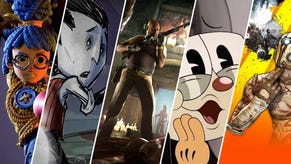
.jpg?width=291&height=164&fit=crop&quality=80&format=jpg&auto=webp)
